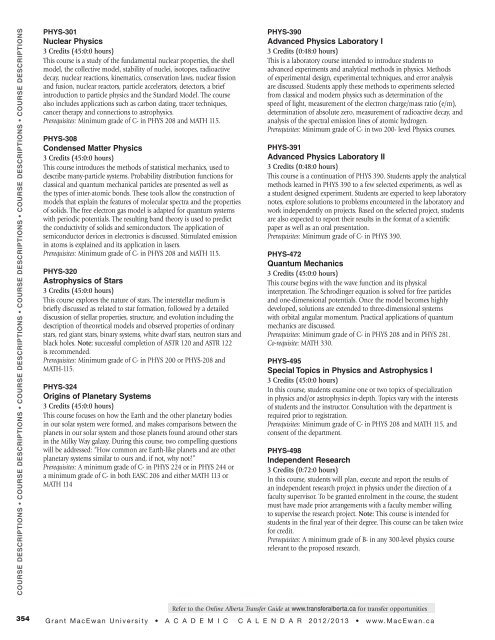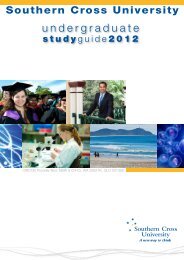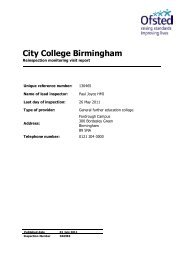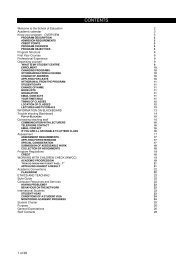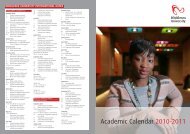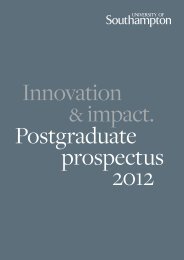Academic Calendar 2012/2013
Academic Calendar 2012/2013
Academic Calendar 2012/2013
You also want an ePaper? Increase the reach of your titles
YUMPU automatically turns print PDFs into web optimized ePapers that Google loves.
course Descriptions • course Descriptions • course Descriptions • course Descriptions • course Descriptions • course DescriptionsPHYS-301Nuclear Physics3 Credits (45:0:0 hours)This course is a study of the fundamental nuclear properties, the shellmodel, the collective model, stability of nuclei, isotopes, radioactivedecay, nuclear reactions, kinematics, conservation laws, nuclear fissionand fusion, nuclear reactors, particle accelerators, detectors, a briefintroduction to particle physics and the Standard Model. The coursealso includes applications such as carbon dating, tracer techniques,cancer therapy and connections to astrophysics.Prerequisites: Minimum grade of C- in PHYS 208 and MATH 115.PHYS-308Condensed Matter Physics3 Credits (45:0:0 hours)This course introduces the methods of statistical mechanics, used todescribe many-particle systems. Probability distribution functions forclassical and quantum mechanical particles are presented as well asthe types of inter-atomic bonds. These tools allow the construction ofmodels that explain the features of molecular spectra and the propertiesof solids. The free electron gas model is adapted for quantum systemswith periodic potentials. The resulting band theory is used to predictthe conductivity of solids and semiconductors. The application ofsemiconductor devices in electronics is discussed. Stimulated emissionin atoms is explained and its application in lasers.Prerequisites: Minimum grade of C- in PHYS 208 and MATH 115.PHYS-320Astrophysics of Stars3 Credits (45:0:0 hours)This course explores the nature of stars. The interstellar medium isbriefly discussed as related to star formation, followed by a detaileddiscussion of stellar properties, structure, and evolution including thedescription of theoretical models and observed properties of ordinarystars, red giant stars, binary systems, white dwarf stars, neutron stars andblack holes. Note: successful completion of ASTR 120 and ASTR 122is recommended.Prerequisites: Minimum grade of C- in PHYS 200 or PHYS-208 andMATH-115.PHYS-324Origins of Planetary Systems3 Credits (45:0:0 hours)This course focuses on how the Earth and the other planetary bodiesin our solar system were formed, and makes comparisons between theplanets in our solar system and those planets found around other starsin the Milky Way galaxy. During this course, two compelling questionswill be addressed: “How common are Earth-like planets and are otherplanetary systems similar to ours and, if not, why not?”Prerequisites: A minimum grade of C- in PHYS 224 or in PHYS 244 ora minimum grade of C- in both EASC 206 and either MATH 113 orMATH 114PHYS-390Advanced Physics Laboratory I3 Credits (0:48:0 hours)This is a laboratory course intended to introduce students toadvanced experiments and analytical methods in physics. Methodsof experimental design, experimental techniques, and error analysisare discussed. Students apply these methods to experiments selectedfrom classical and modern physics such as determination of thespeed of light, measurement of the electron charge/mass ratio (e/m),determination of absolute zero, measurement of radioactive decay, andanalysis of the spectral emission lines of atomic hydrogen.Prerequisites: Minimum grade of C- in two 200- level Physics courses.PHYS-391Advanced Physics Laboratory II3 Credits (0:48:0 hours)This course is a continuation of PHYS 390. Students apply the analyticalmethods learned in PHYS 390 to a few selected experiments, as well asa student designed experiment. Students are expected to keep laboratorynotes, explore solutions to problems encountered in the laboratory andwork independently on projects. Based on the selected project, studentsare also expected to report their results in the format of a scientificpaper as well as an oral presentation.Prerequisites: Minimum grade of C- in PHYS 390.PHYS-472Quantum Mechanics3 Credits (45:0:0 hours)This course begins with the wave function and its physicalinterpretation. The Schrodinger equation is solved for free particlesand one-dimensional potentials. Once the model becomes highlydeveloped, solutions are extended to three-dimensional systemswith orbital angular momentum. Practical applications of quantummechanics are discussed.Prerequisites: Minimum grade of C- in PHYS 208 and in PHYS 281.Co-requisite: MATH 330.PHYS-495Special Topics in Physics and Astrophysics I3 Credits (45:0:0 hours)In this course, students examine one or two topics of specializationin physics and/or astrophysics in-depth. Topics vary with the interestsof students and the instructor. Consultation with the department isrequired prior to registration.Prerequisites: Minimum grade of C- in PHYS 208 and MATH 115, andconsent of the department.PHYS-498Independent Research3 Credits (0:72:0 hours)In this course, students will plan, execute and report the results ofan independent research project in physics under the direction of afaculty supervisor. To be granted enrolment in the course, the studentmust have made prior arrangements with a faculty member willingto supervise the research project. Note: This course is intended forstudents in the final year of their degree. This course can be taken twicefor credit.Prerequisites: A minimum grade of B- in any 300-level physics courserelevant to the proposed research.354Grant MacEwan University • A C A D E m I CRefer to the Online Alberta Transfer Guide at www.transferalberta.ca for transfer opportunitiesC A L E N D A R <strong>2012</strong>/<strong>2013</strong> • www.MacEwan.ca


